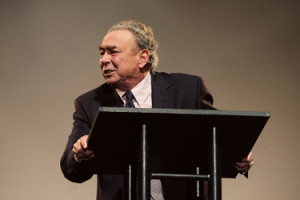 Dr. R. C. Sproul, in an article that first appeared in Tabletalk magazine” that strange malady that seems to afflict so many people who have just seen the truth of the Reformed doctrines of grace. We’ve all known one of these “cage-stage Calvinists.” Many of us were even one of them when we were first convinced of God’s sovereignty in salvation.
Dr. R. C. Sproul, in an article that first appeared in Tabletalk magazine” that strange malady that seems to afflict so many people who have just seen the truth of the Reformed doctrines of grace. We’ve all known one of these “cage-stage Calvinists.” Many of us were even one of them when we were first convinced of God’s sovereignty in salvation.
Cage-stage Calvinists are identifiable by their insistence on turning every discussion into an argument for limited atonement or for making it their personal mission to ensure everyone they know hears—often quite loudly—the truths of divine election. Now, having a zeal for the truth is always commendable. But a zeal for the truth that manifests itself in obnoxiousness won’t convince anyone of the biblical truth of Reformed theology. As many of us can attest from personal experience, it will actually push them away.
Roger Nicole, the late Swiss Reformed theologian and colleague of mine for several decades, once remarked that all human beings are by nature semi-Pelagian, believing that they are not born as slaves to sin. In this country, particularly, we have been indoctrinated into a humanistic understanding of anthropology, especially with respect to our understanding of human freedom. This is the land of the free, after all. We don’t want to believe that we are burdened by negative inclinations and outright enmity toward God, as the Bible teaches us (Rom. 3:9–20). We think that true freedom means having the ability to come to faith without the vanquishing power of saving grace. When we realize that this is not true, that Scripture paints a bleak picture of the human condition apart from grace, that it says it is impossible for us to choose rightly, we want to make sure that everybody else knows it as well. Sometimes we are even angry that no one told us about the true extent of our depravity and the majesty of God’s sovereign grace before.
This gives birth to cage-stage Calvinists, those newly minted Reformed believers who are so aggressive and impatient that they should be locked in a cage for a little while so that they can cool down and mature a little in the faith. At times, someone who becomes convinced of the biblical doctrines of grace finds himself in conflict with friends and family because of his discovery of Reformed theology. More than once I’ve been asked how one should handle hostility from loved ones regarding Reformed theology. If Reformed convictions are causing problems, should one just drop the subject altogether? Are we responsible for convincing others of the truth of the doctrines of grace?
The answer is both yes and no. First let’s consider the “no.” Scripture says that “neither he who plants nor he who waters is anything, but only God who gives the growth” (1 Cor. 3:7). Paul is speaking primarily of evangelism in that verse, but I think we can apply it to growth in Christ even after conversion. The Holy Spirit convinces us of truth, and one’s coming to embrace Reformed theology shows this quite clearly. Given our semi-Pelagian inclinations, it takes a tremendous amount of exposure to the Word of God to overcome that natural bias against the doctrines of grace. People hold tenaciously to a particular view of free will that is not taught in Scripture. Calvin once remarked that if you mean by free will a will that is unencumbered by the weight of sin, you’ve used a term that’s far too exalted to apply to us. It takes a lot to overcome the exalted view that most sinners have of themselves. Only the Spirit can finally convince people of His truth.
Recognizing the Spirit’s work, however, does not mean we are silent or stop believing the truth of Scripture. We don’t give up the doctrines of grace to keep peace in the family or with friends. John Piper puts it well when he says that we not only have to believe the truth, that it’s not enough even to defend the truth, but we must also contend for the truth. That does not mean, however, that we are to be contentious people by nature. So yes, we are to share what we have learned about God’s sovereign grace with those around us.
However, if we really believe the doctrines of grace, we learn how to be gracious about it. When we remember how long it took us to get past the difficulties we once had with the full biblical picture of divine sovereignty and our enslavement to sin, we can view our non-Reformed friends and family more sympathetically and share the truth with them more graciously. One of the first things a person who is excited about his discovery of the doctrines of grace must learn quickly is to be patient with friends and family. God took time with us to convince us of His sovereignty in salvation. We can trust Him to do the same with those we love.
 This misunderstands the objection entirely. If we could isolate divine foreknowledge, detaching it from God’s other attributes and actions, then this could be a reasonable point. If God’s foreknowledge were just like mine, only vast, then what is true of my foreknowledge at a given instant would be true of God’s foreknowledge at all those other instants. Fair enough. If I see a bicyclist hurtling toward a tree, I can have certain foreknowledge that he will hit that tree, and yet, because I am fifty feet away, my knowledge is in no way responsible for the collision. Why would this be different just because God can see ten bicyclists, or a thousand of them?
This misunderstands the objection entirely. If we could isolate divine foreknowledge, detaching it from God’s other attributes and actions, then this could be a reasonable point. If God’s foreknowledge were just like mine, only vast, then what is true of my foreknowledge at a given instant would be true of God’s foreknowledge at all those other instants. Fair enough. If I see a bicyclist hurtling toward a tree, I can have certain foreknowledge that he will hit that tree, and yet, because I am fifty feet away, my knowledge is in no way responsible for the collision. Why would this be different just because God can see ten bicyclists, or a thousand of them?
